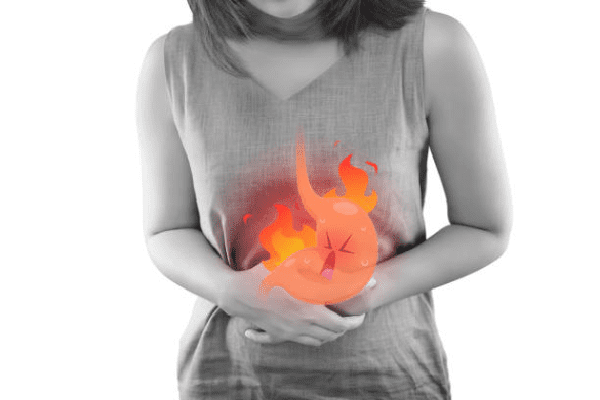Digestive system >>>> Causes and signs of gastritis
Causes and signs of gastritis.

Gastritis is an inflammation of the lining of the stomach from the inside. The danger of developing gastritis lies in the fact that the inflammatory process can affect not only the mucous membrane, but also the deeper tissues of the stomach, gradually destroying the cellular structures of the inner layers, gets to the muscle tissue, entails the appearance of ulcers, the risk of stomach perforation and gastric bleeding, in chronic injuries, gastric tissue necrosis and the development of stomach cancer.
With gastritis, digestive disorders are observed, including impaired enzymatic activity of the stomach, impaired absorption of useful food components, metabolic disorders, and dyspeptic disorders.
The causes of gastritis are different:
- Increased acidity,
- Foods that irritate the gastric mucosa (spicy, excessively sour, hard, poorly chewed),
- Allergens that cause inflammatory processes in the gastric mucosa (food, medicinal),
- Substances that provoke an increased release of hydrochloric acid (including medicines, food ingredients, drinks),
- Toxic substances accidentally trapped in the stomach cavity and injuring the mucous membrane,
- Burns of the mucous layer in case of ingestion of alkalis, acids, alcohols, excessively hot food into the stomach,
- Irritations and injuries of the stomach lining as a result of the use of drugs,
- Injury to the stomach by ingested foreign objects (such as bones),
- Pathogenic microflora that secretes toxins that irritate the gastric mucosa, especially chronic infections (Helicobacter pylori, staphylococci, colibacteria and others),
- Duodenogastric reflux - the reflux of bile from the duodenum into the stomach cavity,
- Autoimmune processes,
- Disorders of the endocrine glands,
- Disorders of the motor function of the stomach,
- Violation of the blood supply to the gastric mucosa,
- Fasting and eating disorders lead to the throwing of hydrochloric acid into an empty stomach,
- Stress affects the functional activity and trophism of stomach tissues.
Signs of gastritis can vary depending on which factor is causing it. But for most gastritis, the characteristic symptoms are:
- sharp or dull pain in the stomach on an empty stomach or after eating (even an hour and a half after food enters the stomach), often the pains are cramping;
- burning in the stomach, belching;
- dyspeptic disorders: diarrhea or constipation, flatulence and others;
- nausea, urge to vomit.
The most dangerous forms of gastritis: erosive and phlegmonous. Erosive gastritis can provoke gastric bleeding, the symptoms of which are the presence of bloody clots in the vomit, tar-like stools. Phlegmonous gastritis causes purulent inflammation of the stomach walls, the symptoms of which are high fever and poorly tolerated pain in the epigastric region. With untimely surgical intervention, phlegmonous gastritis can turn into peritonitis, which is a deadly condition.

Read

Read



























